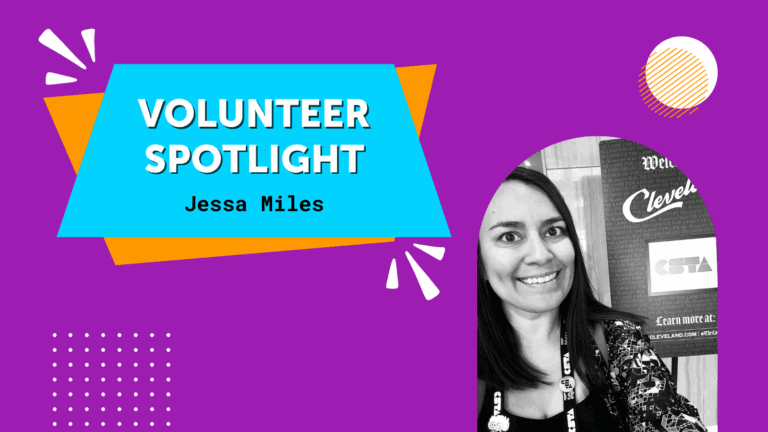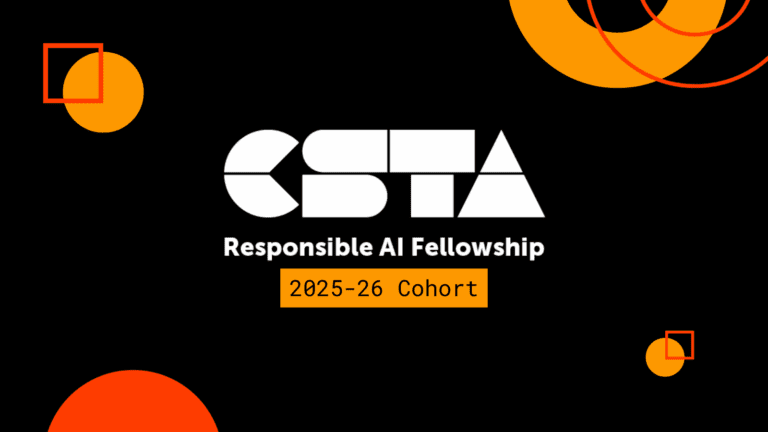Full Story
There are over 200 sessions on the schedule for CSTA 2024! If you’re an administrator or coach who is feeling overwhelmed with where to start, we’ve compiled a list of recommended sessions from the admin/coaching strand.
Bringing AI Professional Development to Your Staff
Presented by Micah Kennedy
July 16, 2024, from 9 a.m. to noon PT
*This session is a pre-conference workshop and can be added to your registration for an additional charge
By now, we’ve all heard the grand claims about the potential of artificial intelligence to revolutionize education by reducing teacher work time and tailoring educational content to each student. But unless we educate teachers on how to use AI effectively and safely, it will remain an untapped resource. In this session, you’ll learn about AI’s impacts on education and acquire the knowledge, tools, and resources to support your staff in their AI journeys.
This workshop offers attendees a professional development session suitable for CS teachers, encouraging collaboration and co-planning. At the close of the session, participants will receive extended resources and a planning guide to help formulate your own professional development.
Reimagined High School CS Pathways for the Future
Presented by Bryan Twarek and Julie Smith
July 17, 2024, from 1-2 p.m. PT
Computer science education has undergone a rapid evolution over the last decade. A growing number of secondary and postsecondary students are choosing to study CS or pursue tech-related careers, while the movement for universal K–12 CS education has created a more diverse pool of CS students than in previous generations. At the same time, trends in the tech industry have led to a growing demand for skills relating to artificial intelligence, machine learning, and data science.
This session will identify and share recommendations for how these industry trends should inform the future of AP Computer Science, course pathways in high school, and introductory CS courses at colleges and universities. We will share findings from the Reimagining CS Pathways project, which explores new pathways for learning CS in high school and relating that learning to the knowledge, skills, and dispositions needed for the careers of the future.
It Seemed Like a Good Idea at the Time: CSTA Edition
Presented by Lauren Bricker
July 17, 2024, from 1-2 p.m. PT
Conference presentations usually focus on successful innovations: new ideas that yield significant improvements to current practice. Yet we often learn more from failure than from success. In the spirit of similar, very successful, panels presented yearly at the SIGCSE Technical Symposium, this session offers the opportunity to “celebrate failure” in K–12 CS education. We will present four case studies of “good ideas” for improving K–12 CS education that didn’t go as planned. Each contributor will describe their “good idea,” the situation that resulted, and the wider lessons for the CS teacher community. Our goal is to foster a supportive community where failure is celebrated rather than criticized, one where we can laugh and learn together from our collective experiences.
Bridging the CS Gap between Schools and Communities
Presented by Desiree White-Price and Tina Dietrich
July 17, 2024, from 2-3:30 p.m. PT
This presentation explores computer science equity through the lens of an afterschool VEX robotics club for mothers and daughters. In school districts where a majority of students come from low socioeconomic status backgrounds, CS requirements may be minimal or nonexistent in the early grades, while students in middle and high school do not see themselves in tech careers. Our mother/daughter afterschool VEX Robotics Club introduced young girls to computer science at a local community center. We also invited local community members and alumni to our program to expose our scholars to potential careers in tech. Come to this session to learn how to use the power of community to promote CS inclusion!
Empowering Educators: Integrating K–8 CS across Core Disciplines
Presented by Renée Dawson and Nicholas Grzeda
July 18, 2024, from 9-10 a.m. PT
This session advocates for a comprehensive understanding of CS through a seamless integration of K–8 CS standards within core subjects like mathematics, science, language arts, and social science. The presentation will offer practical strategies for educators, emphasizing interdisciplinary connections that enhance learning outcomes and foster critical thinking, problem-solving, and creativity.
Loudoun County Public Schools (LCPS) has been building a CS integration model since the inception of the 2017 Computer Science Standards of Learning. By blending CS principles with established curricula, educators can empower students to navigate an increasingly tech-centric world. This session aims to inspire and equip educators, school administration, and district leaders to cultivate student proficiency in foundational knowledge and contemporary digital literacy skills.
Teacher Wellness: When a walk is not enough
Presented by Cicely Day
July 18, 2024, from 10:30-11:30 a.m. PT
In this workshop, I will share how I burned out as a teacher, how I dealt with it, and how one diagnosis changed everything forever. I will share my story of how this diagnosis changed the way I see myself and the world around me and how I now use tools and resources to help me be my best self. I will discuss how to recognize the signs of teacher burnout and the resources, tips, and tools I learned. At the end of this workshop, I will help participants make a mini poster to help them remember to love and care for themselves.
Unlocking AI: Teaching Artificial Intelligence in K–12
Presented by Nicholas Yates and Nora Burkhauser
July 19, 2024, from 9-10 a.m. PT
With the recent release of generative AI like ChatGPT, many teachers are interested in learning more about AI, how it can be utilized in a classroom setting, and how it will impact our everyday lives. This session shares how Maryland’s education system has been rising to the new challenges presented by AI. Since 2020, the Maryland Center for Computing Education has offered teacher professional development that explores artificial intelligence and suggests ways to incorporate AI into lessons at all levels and in all content areas.
In this presentation, we will give an overview of online and in-person PD options, share a sample activity from the PD, and discuss our successes and struggles in past iterations of these PD courses. We’ll begin by introducing attendees to the history and main concepts of artificial intelligence and machine learning, with a focus on the impact and ethics of AI. Participants will develop and share an AI-focused lesson plan suitable for their own school or classroom. Next, we’ll delve deeper into the concepts and algorithms used in machine learning, review available AI curricula and online tools, and create an artifact that uses AI and can be implemented in the classroom. Unlock the power of AI for your students!
Register for CSTA 2024
Be sure to head to the full conference program to read more about these recommendations and plan which sessions you want to attend. If you haven’t registered for the annual conference yet, or want to bring your teachers who teach computer science, head to the CSTA 2024 website to secure your spot. We are excited to see you there!




